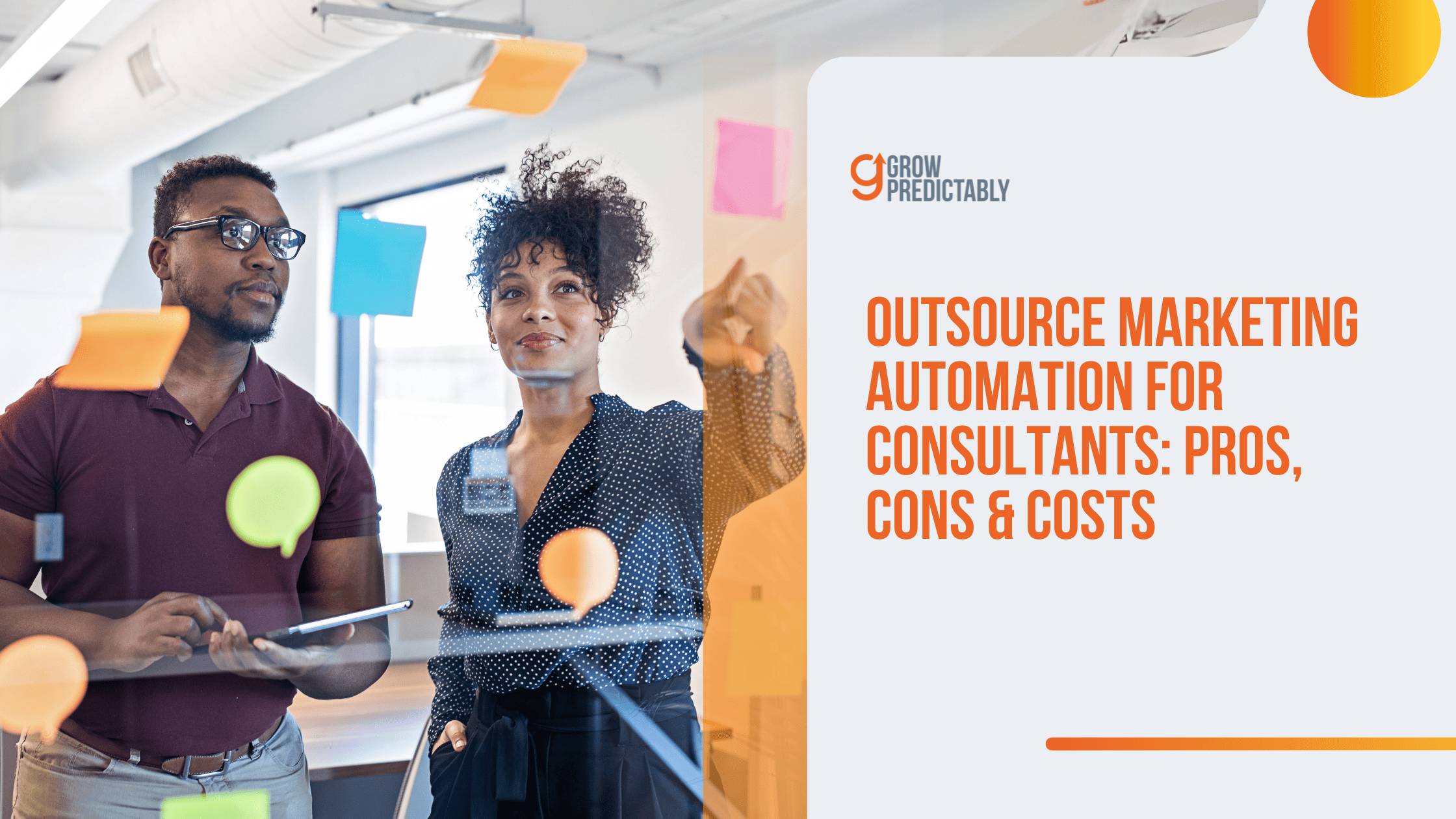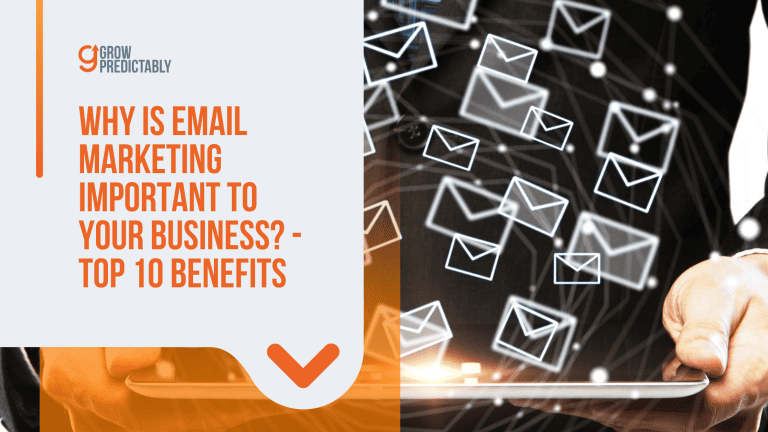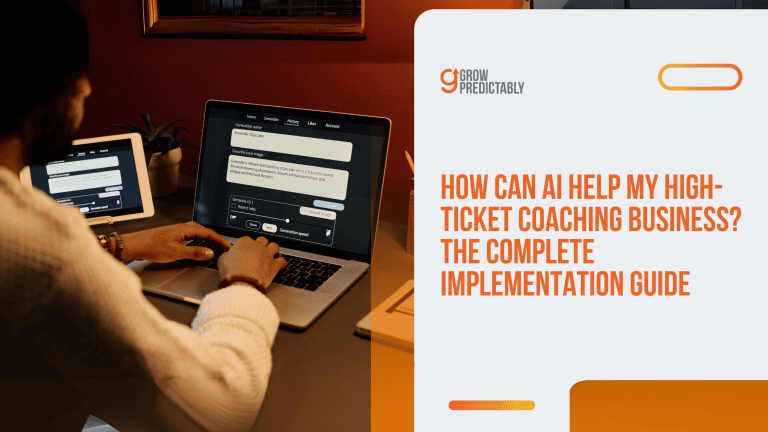Outsource Marketing Automation for Consultants: Pros, Cons, and Costs
Let’s cut right to it: outsource marketing automation for consultants means hiring outside experts to build and run automation systems that handle every step of your client journey.
They cover lead generation, onboarding, and long-term follow-up. This way, you get more clients with less effort and keep a personal touch.
Instead of drowning in busywork, these services let specialized pros manage your email sequences, CRM integrations, and social posting, freeing you to reclaim billable hours, target ideal clients, and actually grow your consulting business.
You’ll see the difference in both time (10–15 hours per week back), increased lead flow, and a more consistent pipeline—without the headaches or dropped balls that delay growth.
Ready to build a consulting business that runs and grows—even when you log off?
Everything you need to scale up, save time, and increase revenue is in these actionable strategies.
TL;DR
Outsourcing marketing automation provides consultants with specialized expertise, saves time, and scales marketing efforts efficiently, but it comes with costs and potential challenges like losing personal brand voice and control. Weigh the pros and cons to decide if the financial and time investments lead to expected returns.
KEY TAKEAWAYS
- Evaluate whether your business can afford outsourcing by calculating current marketing costs in terms of money and time compared to potential ROI.
- Ensure you have a clear customer avatar and consistent revenue before outsourcing so your external team aligns with your business goals.
- Protect your brand by setting up clear communication protocols and having an approval process for all client-facing content.
What Do You Need to Consider Before Outsourcing Marketing?
Getting clear on who is your target audience is the first step to every effective marketing.
Before considering outsourced marketing, make sure you’ve identified your target audience down to the t.
Most consultants try to cater to everyone and end up helping no one.
You need to get crystal clear on exactly who you serve before you can solve their problems.
Your customer avatar isn’t some marketing exercise you do once and forget – it’s the foundation that determines whether your consulting business thrives or dies.
Think of your ideal client as a real person sitting across from you at coffee.
What keeps them up at 3 AM? What makes them want to throw their laptop out the window?
Statistics show that 24% of brands generated more leads using customer avatars while 36% shortened their sales cycles, according to Digital Marketing Institute. (Source)
Marketing automation enables consultants to build and maintain personalized relationships with their customers, making it easier to target and customize communication for better engagement and experience.
How Do You Define Your Ideal Consulting Client?
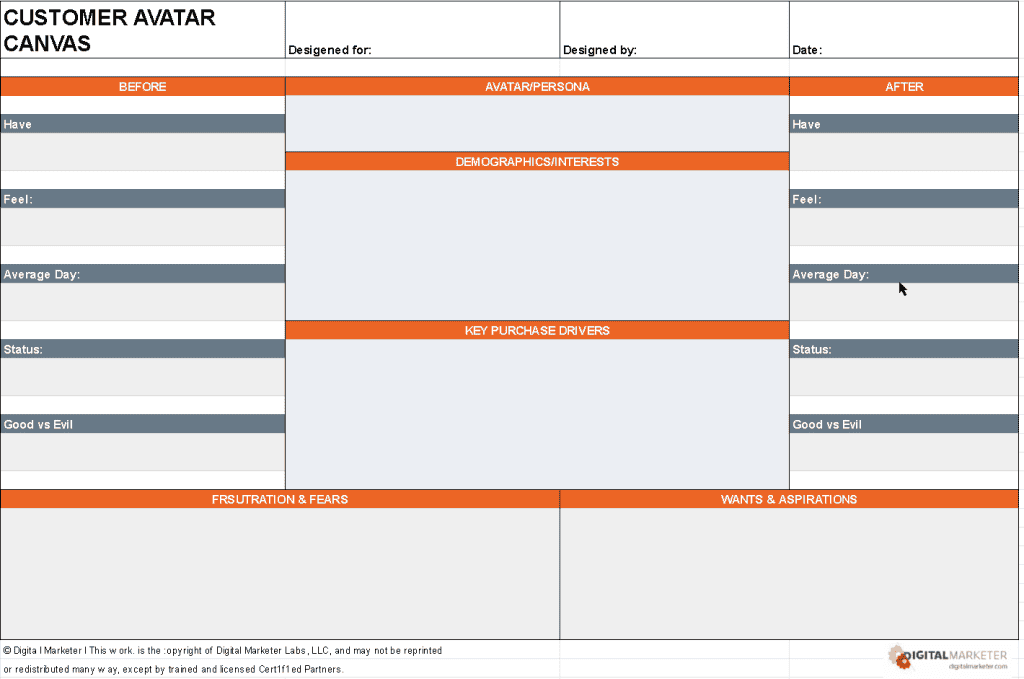
Your customer avatar needs three core elements that most people get wrong.
First, nail down their exact role and responsibilities.
Are they a CEO juggling everything, a marketing director drowning in campaigns, or a sales manager missing quotas?
Second, identify their specific pain points that make them lose sleep.
Third, understand what success looks like to them personally – not just their company goals, but what they personally want to achieve.
Here’s what your avatar should include:
- Specific job title and company size – “Marketing Director at 50-person SaaS company” beats “business owner”
- Daily struggles they face – Too much admin work eating into strategy time, inconsistent lead generation killing predictable growth
- What they’ve already tried – Failed Facebook ads, hired and fired three agencies, tried doing it themselves for six months
- Personal motivations – Want to prove they can scale the department, need more family time, tired of being reactive instead of strategic
- Budget and decision-making power – Can they write a check today or need three approvals?
- Solo entrepreneurs – Often have unique needs and may benefit from simple, entry-level marketing automation solutions, especially for tasks like monthly newsletters or small-scale updates.
The beauty of this specificity is that when you talk to prospects, they think you’re reading their mind.
Is It Important to Show the Before/After Transformation?
Yes — absolutely. Showing the before/after transformation is essential because it lets prospects recognize their current pain and imagine a concrete, desirable future with your help.
Your prospects need to see themselves in two movies.
The first movie is their current reality – chaos, frustration, and spinning wheels.
The second movie is their life after working with you – organized, growing, and finally in control.
Paint both pictures so clearly they can taste the difference.
Before working with you, your ideal client lives in constant firefighting mode.
They start each day with good intentions but get pulled into urgent tasks that don’t move the needle.
Their marketing feels like throwing darts blindfolded – sometimes something works, but they can’t replicate it.
They work nights and weekends but still feel behind.
Revenue comes in waves instead of steady streams, making it impossible to plan or hire confidently.
The transformation you provide changes everything:
- Time freedom – Instead of working 70-hour weeks, they focus on high-value activities while systems handle the rest
- Predictable growth – Consistent lead flow means they can forecast revenue and make smart hiring decisions
- Strategic thinking – No more reactive mode – they’re six months ahead instead of six months behind
- Personal life restored – Weekend family time instead of weekend catch-up work
- Team confidence – Clear processes everyone can follow instead of everything depending on them
But the real win doesn’t stop there.
It’s getting their life back while their business grows faster than ever.
When you can show this transformation clearly, prospects don’t shop around – they ask when you can start.
What Is Marketing Automation and Why Should Consultants Care?
Marketing automation is software plus workflows that automate repetitive marketing tasks — and consultants should care because it saves time, creates consistency, improves lead-to-client conversion, and lets you focus on billable work that actually grows your business.
Marketing automation is like having a digital assistant that never sleeps, never forgets, and never takes a day off.
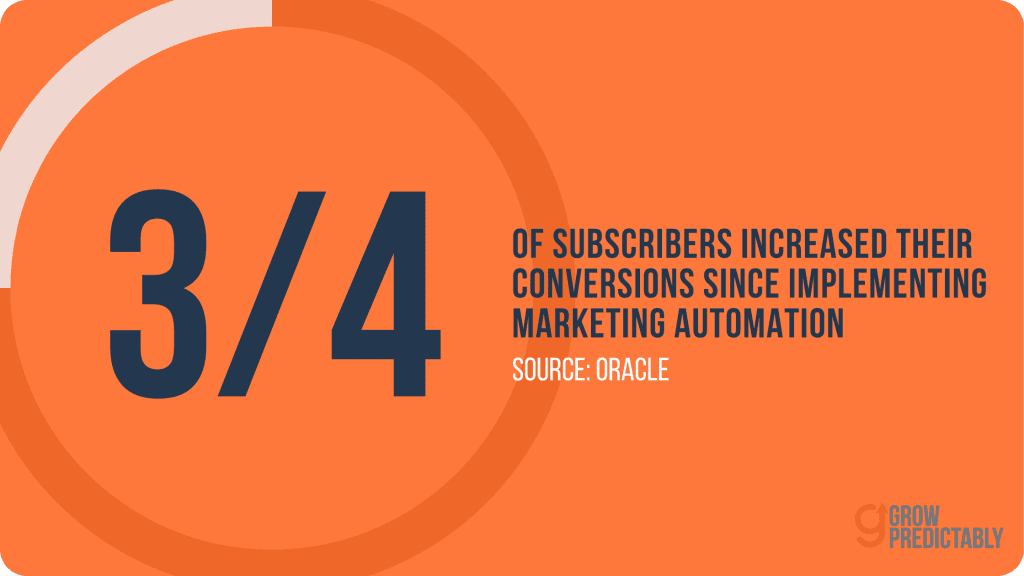
It automatically handles things like sending emails, posting on social media, tracking leads, scoring prospects, and following up at the right time so your audience receives timely, relevant communications at scale.
Think of it as the difference between manually watering each plant in your garden versus installing a sprinkler system that waters everything on schedule.
How Marketing Automation Fits Into Your Daily Work
Your day as a consultant should be spent consulting, not chasing administrative tasks.
Marketing automation takes over the repetitive work that keeps you busy but not profitable.
Instead of spending two hours every morning sending emails and updating spreadsheets, you spend two minutes checking reports and jump straight into client work.
The automation handles your marketing pipeline while you handle your expertise:
- Lead nurturing runs on autopilot – New prospects get welcome sequences, case studies, and value-packed emails without you lifting a finger
- Social media posts go live consistently – Your LinkedIn and other platforms stay active even when you’re heads-down on client projects
- Follow-up reminders never get missed – Hot prospects get contacted at the right time with the right message, every single time
- Client onboarding happens smoothly – New clients receive contracts, questionnaires, and next steps automatically after they sign
According to an Annuitas Group study, brands using marketing automation to nurture leads see a 451% increase in qualified leads, which means you’re not just saving time – you’re actually generating more business. (Source)
The system works harder than any human assistant ever could, and it scales with your growth.
How Marketing Automation Impacts the Customer Journey
Marketing automation directly shapes and accelerates the customer journey by moving prospects through predictable stages — from stranger to client to advocate — without you having to manually manage every interaction.
Your prospects don’t wake up ready to hire you; they move through stages. The Customer Value Journey maps those stages and automation builds the rails so each person progresses reliably instead of relying on one-off outreach.
Marketing automation guides people through each step with the right message at the right time, ensuring no one falls through the cracks.
It’s like putting rails on a train track instead of trying to steer each car individually.
When someone downloads your free guide, automation can immediately deliver educational content that builds trust.
When they engage with that content, they can automatically be invited to book a call. When they don’t respond, a different re-engagement sequence kicks in to try a new approach.
In short, automation turns the customer journey from chaotic and manual into repeatable and measurable — increasing conversions, improving lead nurturing, and freeing you to focus on higher-value work.
Here’s how automation moves people through each stage:
- Awareness stage – Blog subscribers get weekly valuable content that positions you as the expert
- Interest stage – Engaged prospects receive case studies and testimonials showing your results
- Consideration stage – Warm leads get consultation offers and pricing information at the perfect moment
- Purchase stage – Ready buyers receive streamlined proposals and easy payment options
- Onboarding stage – New clients automatically receive welcome packages, contracts, and project kickoff materials
- Delivery stage – Active clients get progress updates, milestone celebrations, and additional resources to maximize results
- Retention stage – Completed clients receive check-in emails, new service announcements, and exclusive content to stay connected
- Advocacy stage – Happy clients get prompted to leave reviews and refer others automatically
Marketing automation has been shown to yield an ROI of $5.44 for every dollar spent, but the real value isn’t just financial.
It’s the peace of mind knowing your marketing machine runs whether you’re sleeping, serving clients, or taking time off.
Your business grows consistently instead of only when you’re actively working on it.
What Does It Mean to Outsource Marketing Automation?
Outsourcing marketing automation means hiring outside experts to handle the technical setup, ongoing management, and optimization of your marketing systems.
Instead of spending weeks learning HubSpot or trying to figure out email sequences, you hand it over to professionals who already know what works.
You focus on what you do best – consulting – while they handle what they do best – making your marketing run like clockwork.
Outsourcing marketing automation can also be an effective strategy for reducing costs compared to building in-house capabilities.
Think of it like hiring a plumber instead of watching YouTube videos about fixing pipes.
Sure, you could probably figure it out eventually, but why waste time and risk flooding your basement when you can call someone who’s done it a thousand times before?
In concern to this, legendary business consultant Peter Drucker’s advice echoes. (Source)
Do what you do best and outsource the rest!
Peter Drucker, Management Thought Leader
According to an Exploding Topics rundown on outsourcing statistics, over 30% of businesses outsource content marketing, and 37% of small businesses outsource at least one business process. (Source)
This tells you that the smartest businesses aren’t trying to do everything themselves.
Your outsourcing partner takes care of the technical heavy lifting while you stay in your zone of genius:
- Platform setup and configuration – They install and configure tools like HubSpot, Mailchimp, or ActiveCampaign based on your business needs
- Email sequence creation – They write and design automated email campaigns that nurture leads and convert prospects
- Integration management – They connect your CRM, website, social media, and other tools so everything works together seamlessly
- Performance monitoring – They track what’s working, what’s not, and make adjustments to improve results continuously
- Prevention of operational oversights – They consistently monitor and manage your automation systems to help prevent operational oversights, ensuring attention to detail and reducing the risk of mistakes.
- Strategy development – They create the overall automation strategy that aligns with your business goals and client journey
Majority of surveyed companies report that outsourcing provides them with the ability to scale operations up or down quickly in response to market demands, which means you can grow your marketing capabilities without the overhead of hiring and training internal staff. (Source)
How Outsourced Marketing Automation Plays Out
Instead of spending your evenings learning Zapier integrations, you let automation experts handle the technical setup while you focus on serving clients and growing revenue.
A marketing automation agency might spend two weeks setting up systems that would take you three months to figure out on your own – and theirs will actually work properly from day one.
Consider these practical examples of what outsourcing looks like in action.
When someone downloads your lead magnet, an automated sequence immediately sends them a welcome email, adds them to your CRM, tags them based on their interests, and starts a nurture sequence – all without you touching anything.
When a prospect books a consultation call, they automatically receive confirmation details, calendar reminders, and prep materials.
When a client finishes a project, they get prompted to leave a review and receive information about additional services.
The experts handle the behind-the-scenes complexity:
- Lead scoring systems – They set up rules that automatically identify your hottest prospects based on behavior and engagement
- Abandoned cart recovery – They create sequences that bring back people who started but didn’t complete your application or purchase process
- Client onboarding automation – They build systems that deliver contracts, collect information, and schedule kickoff calls automatically
- Social media posting – They set up tools that publish your content consistently across platforms without manual posting
- Reporting dashboards – They create easy-to-read reports that show which campaigns are working and which need attention
The beauty is that these systems run whether you’re sleeping, traveling, or focused on client work.
You wake up to new leads, engaged prospects, and organized client information – all handled by systems that experts designed specifically for your business.
Your marketing works harder while you work smarter.
How Do Consultants Benefit from Outsourced Marketing?
Your time is your money.
Every hour you spend fumbling with marketing tools is an hour you’re not billing clients or building relationships.
Outsourcing marketing automation isn’t just about getting help – it’s about multiplying your capacity to grow your business while staying sane.
By outsourcing, you can focus on your organization’s strategic priorities and internal planning, ensuring resources are dedicated to your organization’s core activities.
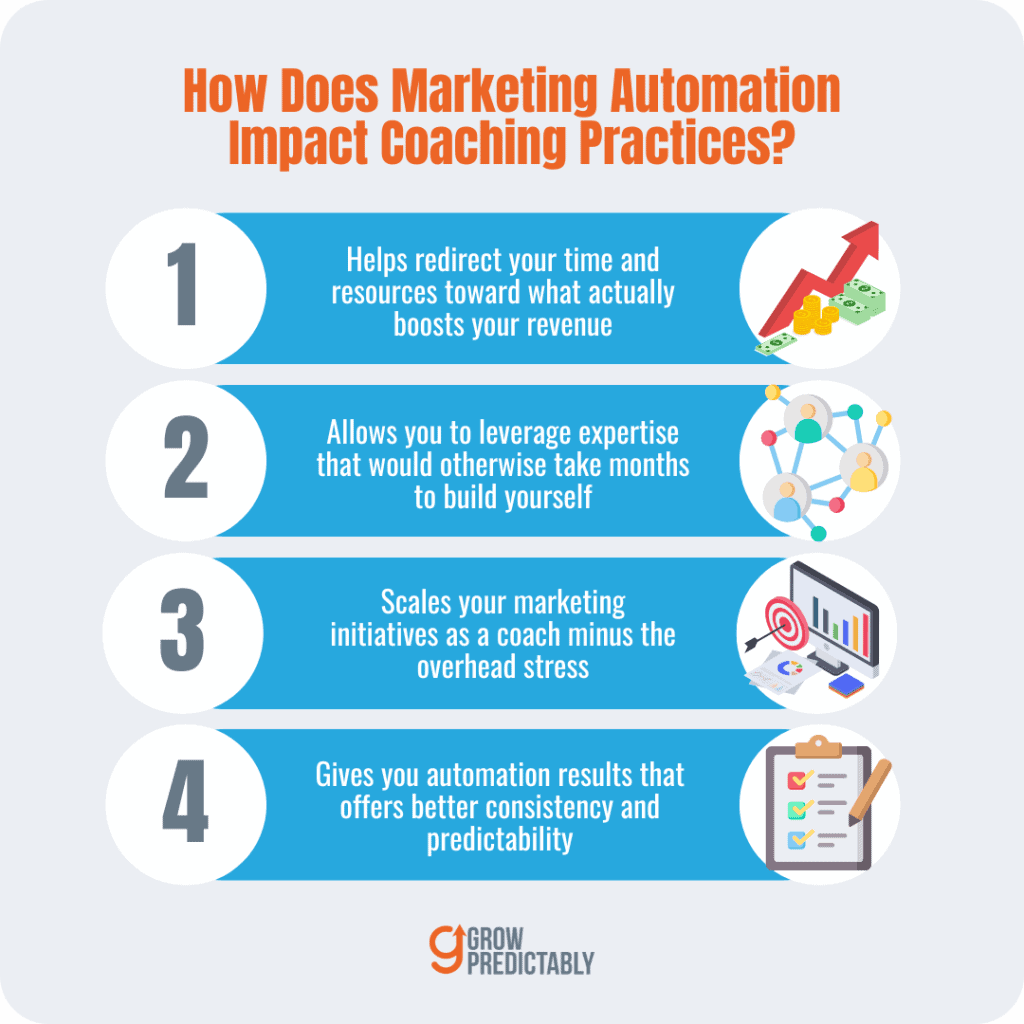
The smartest consultants understand that trying to be a marketing technologist and a consultant makes you mediocre at both.
1. Save Time for What Actually Makes Money
Stop pretending you have unlimited hours in the day.
When you outsource marketing automation, you reclaim the 10-15 hours per week you currently waste on marketing tasks that drain your energy without generating immediate revenue.
Majority of the businesses that outsource report cost reduction as one of the primary reasons for outsourcing. (Source)
But for consultants, the bigger win is time savings that can be converted directly into billable hours.
Instead of spending your evenings setting up email sequences or your weekends troubleshooting integrations, you focus on high-value activities that only you can do.
Your automation partner handles the technical work while you handle client delivery, business development, and strategic thinking.
The math is simple – if you bill $200 per hour and spend 10 hours per week on marketing tasks, outsourcing those tasks for $500 per week still saves you $1,500 in opportunity cost.
Time savings compound in ways most people don’t realize:
- More billable hours – Reclaimed time converts directly to revenue through additional client work
- Better client relationships – You’re not distracted by marketing fires when you should be focused on delivery
- Strategic thinking time – Mental space to plan growth instead of constantly reacting to urgent tasks
- Personal life restoration – Weekends become weekends again instead of catch-up time for marketing
Businesses that outsource can cut labor costs by up to 70%, according to a data from Outsource Accelerator. (Source)
However, consultants often see even higher returns because their time has such direct monetary value.
2. Tap Into Expertise That Takes Years to Build
Marketing automation platforms change constantly.
New features, updated interfaces, and evolving best practices mean what worked six months ago might be outdated today.
Instead of becoming a part-time marketing technologist, you get instant access to professionals who live and breathe these systems every day.
These experts know the shortcuts, workarounds, and advanced strategies that take years to discover on your own.
They’ve made the mistakes on other people’s businesses, not yours.
When HubSpot updates its interface or Mailchimp changes its automation rules, your outsourced team already knows how to adapt your campaigns.
You don’t spend three days figuring out why your sequences stopped working.
The expertise advantage goes beyond just technical knowledge:
- Latest tool knowledge – They know which platforms work best for your specific business model and client journey
- Industry best practices – They understand what email subject lines work, which automation sequences convert, and how to segment audiences effectively
- Integration expertise – They can connect your CRM, scheduling software, and payment systems seamlessly
- Performance optimization – They know how to read analytics and make data-driven improvements to your campaigns
- Compliance knowledge – They stay current on email marketing laws and privacy regulations that could get you in trouble
For every dollar spent on marketing automation, companies saw an average ROI of $5.44 in the first three years, but when experts handle the setup and optimization, those returns often come faster and higher.
3. Scale Your Marketing Without the Overhead Nightmare
Hiring a full-time marketing person costs $60,000-$100,000 per year plus benefits, training, and management time.
Hiring a marketing automation specialist adds another $70,000-$120,000.
Before you know it, you’re looking at $200,000 in annual overhead just to handle marketing that might not even work well initially.
Outsourcing gives you an entire team’s worth of expertise for a fraction of that cost.
When your business grows and needs more sophisticated automation, you scale up the service. When you need to cut costs during slower periods, you scale down.
No layoffs, no severance packages, and no awkward performance conversations.
Scaling advantages become obvious when your business grows:
- Instant capacity increases – Launch new campaigns without hiring new people or learning new skills
- Flexible cost structure – Pay for what you need when you need it instead of carrying fixed overhead
- No management overhead – The outsourcing partner manages their team while you focus on clients
- Multiple skill sets – Get copywriters, designers, technicians, and strategists without separate hiring processes
- Proven systems – Scale using methods that already work instead of experimenting with untested approaches
37% of small businesses are outsourcing IT services and marketing automation is following the same trend as consultants realize the operational benefits. (Source)
4. Better Results Through Professional Strategy and Execution
Amateur marketing automation looks obvious.
Professional marketing automation feels like magic.
The difference is in the details – the timing of messages, the psychology of sequences, and the technical execution that makes everything work smoothly.
When prospects move through your Customer Value Journey, they should feel guided, not marketed to.
Professional automation teams understand the psychology behind each touchpoint.
They know when to send educational content versus sales messages, how to segment audiences based on behavior, and which calls-to-action work best at each stage.
They create experiences that feel personal even though they’re automated.
80% of companies implementing marketing automation experience increased leads and 77% increased customer conversions, according to an Invesp resource on The Rise of Marketing Automation. (Source)
The results speak for themselves when professionals handle the strategy and execution instead of consultants trying to figure it out in their spare time.
Results improve across every metric that matters:
- Higher engagement rates – Professional copy and timing strategies keep prospects interested longer
- Better conversion rates – Optimized sequences turn more prospects into paying clients
- Improved client experience – Smooth onboarding and communication systems create better relationships
- Consistent follow-up – No prospects fall through the cracks because systems handle everything automatically
- Data-driven optimization – Regular testing and improvements based on actual performance data
Your outsourced team treats your marketing automation like their core business because it is their core business.
You get their full attention and expertise instead of your divided attention and amateur-level execution.
What Downsides Do Consultants Need to Watch Out For?
Nobody wants to talk about the ugly side of outsourcing, but ignoring these risks is how consultants end up with damaged client relationships and marketing campaigns that sound nothing like them.
Outsourcing marketing automation isn’t just about finding someone cheap to handle your emails – it’s about finding someone who can represent your business as well as you do.
Get this wrong, and you’ll spend more time fixing problems than you would have spent doing it yourself.
The consultants who succeed with outsourcing know these risks going in and build safeguards to prevent them. (Source)
1. Less Control Over Your Marketing Message
When you hand over your marketing, you’re trusting someone else to speak for your business.
Every email, social post, and follow-up sequence represents you to prospects and clients.
The outsourcing partner might understand marketing automation perfectly but miss the nuances that make your communication style unique.
They might write technically correct emails that get decent open rates but completely miss the personal touch that sets you apart from other consultants.
This control issue shows up in unexpected ways.
Your automation partner might schedule posts during times that don’t align with your audience’s habits, or they might respond to prospect inquiries with generic language when your clients expect personalized attention.
They might prioritize metrics like click-through rates over relationship building, which works for some businesses but could damage your consulting reputation.
The loss of control affects multiple touchpoints:
- Message timing and frequency – They might send more or fewer emails than feels natural for your relationship-based business
- Response handling – Automated responses to prospect questions might miss opportunities for personal connection
- Content approval processes – Delays in getting your sign-off on campaigns can slow down time-sensitive marketing efforts
- Crisis management – When something goes wrong, you’re dependent on their timeline to fix issues that affect your reputation
The solution isn’t to micromanage every detail, but to establish clear approval processes for anything that goes out under your name.
Your outsourcing partner should understand that relationship preservation trumps conversion optimization in the consulting world.
2. Brand Voice Risks That Can Damage Client Relationships
Your brand voice isn’t just how you write – it’s how you think, approach problems, and connect with people.
An outsourcing partner might capture your surface-level messaging but miss the deeper personality traits that make clients choose you over competitors.
They might write emails that sound professional but lack the specific insights or perspectives that position you as an expert in your field.
The brand voice problem becomes critical when outsourced content reaches existing clients or referral sources.
If your automated follow-up emails sound different from how you communicate in person, clients notice.
If your social media posts use language you’d never use in a consultation, it creates cognitive dissonance that can damage trust.
Data security concerns are the most significant risk in 2024, but cultural and communication differences create equally serious problems for consultants whose success depends on authentic relationships.
Your clients hire you for your specific expertise and personality – not generic marketing messages.
Brand voice misalignment shows up in several ways:
- Industry terminology misuse – Using buzzwords incorrectly or missing industry-specific nuances that signal expertise
- Tone inconsistencies – Formal emails when you normally communicate casually, or vice versa
- Value proposition confusion – Emphasizing features instead of the specific outcomes your clients care about
- Cultural mismatches – Missing regional expressions, references, or communication styles your audience expects
To protect your brand voice, create detailed style guides and examples of your best communication.
Don’t just tell them how to write – show them actual emails, posts, and messages that represent your voice perfectly.
3. Communication Gaps That Cost You Opportunities
Outsourcing adds a layer between you and your marketing that can slow down everything from campaign launches to crisis response.
When a hot prospect needs immediate attention or a client has an urgent question, communication delays can cost you business.
The outsourcing partner might be in a different time zone, working with multiple clients, or simply not prioritize your urgent request the way you would.
These communication gaps hurt most when timing matters.
A prospect might be ready to sign a contract but needs one clarification about your process.
If your outsourced team takes 24 hours to respond when you would have responded in 24 minutes, you might lose the deal.
Or a client might post a negative comment that needs immediate, personal attention – not a generic response three hours later.
Communication problems compound when expectations aren’t crystal clear:
- Response time expectations – Unclear about when they should escalate urgent issues directly to you
- Decision-making authority – Confusion about what they can handle independently versus what needs your approval
- Reporting frequency – Not enough regular updates to catch problems before they become crises
- Contact protocol – No clear process for reaching you when time-sensitive issues arise
The best outsourcing relationships include detailed communication protocols that specify exactly when and how to reach you for different types of situations.
Your partner should know the difference between routine campaign updates and urgent client issues.
4. Data Security Risks You Can’t Ignore
Marketing automation requires access to your most sensitive business information – client lists, revenue data, communication histories, and strategic plans.
When you outsource, you’re sharing this information with an outside company that might not have the same security standards you do.
Research indicates that by 2025, 60% of organizations will prioritize cybersecurity risks when engaging with third-party vendors, which shows how serious this issue has become.
The data security risk isn’t just about hackers – it’s about what happens to your information if the outsourcing relationship ends badly, if their company gets acquired, or if an employee leaves with access to your client data.
Your consulting reputation depends on client confidentiality, and any data breach could destroy relationships you’ve spent years building.
Outsourcing exposes businesses to various cyber risks, such as data breaches, ransomware attacks, regulatory compliance issues, and consultants face additional risks because client information is often more sensitive than typical business data.
Security vulnerabilities include multiple threat vectors:
- Access control weaknesses – Too many people with access to your sensitive client information
- Data storage practices – Your information mixed with other clients’ data in ways that increase exposure risk
- Employee turnover – People leaving the outsourcing company while still having access to your systems
- Compliance gaps – Different standards for data protection that might not meet your industry requirements
- Backup and recovery – Unclear policies about how your data is protected and what happens if their systems fail
Before sharing any client information, verify that your outsourcing partner has proper security certifications, clear data handling policies, and insurance coverage for data breaches.
The cheapest option is rarely the most secure option.
5. Minimizing Risks Through Smart Planning
The goal is smooth operations with appropriate oversight, not micromanagement that defeats the purpose of outsourcing.
When planning effective outsourcing, it’s also crucial to consider the second variable—the depth of use or reliance on your marketing automation platform—as this can significantly impact risk management and the level of oversight required.
What Does Outsourcing Marketing Automation Cost?
Money talks, but time screams.
When you’re comparing outsourcing costs, you’re not just looking at what you’ll pay – you’re looking at what you’ll save and what you’ll earn.
Most consultants get sticker shock when they see outsourcing prices, but they forget to calculate the cost of doing nothing or the cost of doing it wrong themselves.
The real question isn’t whether you can afford to outsource marketing automation – it’s whether you can afford not to.
Every month you spend learning platforms instead of serving clients is money left on the table.
Every prospect who doesn’t get followed up properly because you’re overwhelmed is revenue walking out the door.
Project-Based Setup Fees
Getting your marketing automation set up right the first time prevents months of headaches later.
Initial investment for services can range anywhere from $2000 to $10,000 depending on the agency, but this one-time cost covers everything from platform selection to complete system configuration.
Basic setups for simple consulting businesses might cost $2,000-4,000, while complex multi-service consultancies with sophisticated client journeys can run $8,000-15,000 or more.
The setup fee covers more than just technical configuration.
You’re paying for strategy development, platform integration, email sequence creation, and testing everything before it goes live.
A good setup includes connecting your CRM, website, scheduling software, and payment systems so they all work together seamlessly.
You’re also getting the initial content creation – welcome sequences, nurture campaigns, and follow-up automation that would take you weeks to write and test yourself.
Project-based work typically includes several key components:
- Platform selection and setup – Choosing the right tools for your business size and needs, then configuring them properly
- Integration development – Connecting all your existing systems so data flows automatically between them
- Content creation – Writing email sequences, creating landing pages, and developing automated campaigns
- Testing and optimization – Making sure everything works before launching and training you on basic management
- Documentation and training – Providing guides and sessions so you understand how your new system works
The higher-end project fees often include more sophisticated features like advanced lead scoring, complex automation workflows, and custom integrations that aren’t available in standard packages.
For most consultants, a mid-range setup around $4,000-6,000 provides everything needed to automate client acquisition and retention effectively.
Monthly Retainer Costs
Marketing agency costs can range from $1,000 to $20,000+ per month, depending on the scope of services provided, but marketing automation specifically runs much more affordable than full-service marketing.
Most consultants find that ongoing automation management costs $1,500-4,000 per month, which covers monitoring, optimization, content updates, and performance reporting.
The monthly retainer keeps your automation running smoothly while you focus on client work.
Your automation partner handles campaign monitoring, makes adjustments based on performance data, creates new content as needed, and ensures everything stays up-to-date with platform changes.
They’re also available for questions, troubleshooting, and strategy adjustments as your business grows.
A 16-hour marketing retainer with an agency costs $5,000 a month on average, roughly $60,000 a year, but marketing automation retainers typically require fewer hours since the systems handle most of the work automatically.
You’re paying for expertise and oversight, not constant hands-on management.
Monthly retainer services usually include:
- Performance monitoring and reporting – Regular analysis of what’s working and what needs adjustment
- Content updates and creation – New email sequences, social posts, and campaign materials as needed
- Technical maintenance – Platform updates, integration fixes, and system optimization
- Strategy refinement – Adjusting campaigns based on results and business changes
- Support and consultation – Answering questions and providing guidance on marketing decisions
Marketing agencies charge $500-$10,000 and up per month, but most consultants find the sweet spot around $2,000-3,500 monthly for comprehensive automation management.
This investment typically pays for itself through improved lead quality and conversion rates within the first few months.
Compare the Real Cost of DIY
Your time isn’t free, even if you’re not billing for it.
When you spend 15 hours per week on marketing tasks, you’re paying an opportunity cost that most consultants severely underestimate.
If you bill $200 per hour, those 15 hours represent $3,000 in lost revenue every week – that’s $156,000 per year in opportunity cost for DIY marketing.
The DIY approach also includes hidden costs that add up quickly.
You’ll pay for multiple software subscriptions, training courses, and tools that professionals already own and know how to use.
The average salary for a Marketing Automation Associate is $78,154 per year, and Marketing Automation Consultants average $92,835 in 2024.
Even if you hired someone part-time, you’re looking at $40,000-50,000 annually plus benefits and training time.
The learning curve costs extend beyond just time invested.
Every mistake you make while learning costs money – poorly performing campaigns, missed opportunities, and technical problems that hurt your reputation.
Professional automation specialists have already made these mistakes on other people’s businesses, not yours.
DIY hidden costs include multiple expense categories:
- Software subscriptions – Email platforms, CRM systems, automation tools, and analytics software add up to $300-800 monthly
- Training and education – Courses, certifications, and ongoing learning to stay current with platform changes
- Time investment – Learning curves, troubleshooting, and ongoing management that could be spent on billable work
- Mistake recovery – Fixing campaigns that don’t work, rebuilding broken integrations, and recovering from technical problems
- Opportunity costs – Revenue lost while focusing on marketing instead of client acquisition and delivery
The math becomes clear when you factor in opportunity costs.
If outsourcing costs $3,000 monthly but saves you 10 hours per week, you’re saving $8,000 monthly in opportunity costs alone.
That’s a net positive of $5,000 per month, or $60,000 annually, just from time savings.
Making the Investment Decision
The best outsourcing investments pay for themselves quickly through improved results and time savings.
A well-executed automation system typically improves lead conversion rates by 20-30% while reducing the time you spend on marketing tasks by 70-80%.
When you combine increased revenue with decreased time investment, the ROI becomes obvious.
Start by calculating your current marketing costs – not just money, but time translated into hourly rates.
Add the cost of missed opportunities from inconsistent follow-up and poor lead nurturing. Then compare that total to outsourcing costs.
Most consultants discover they’re already spending more on DIY marketing than professional outsourcing would cost.
The decision becomes easier when you consider that professional automation gets better results than amateur efforts.
Your outsourced partner’s other clients benefit from campaign improvements and optimizations, which means your automation gets continuously better without additional investment from you.
DIY automation only improves when you have time to work on it, which usually means it stays the same for months at a time.
Is Outsourcing Right for Your Consulting Business?
Outsourcing can be a game-changer for your consulting business, but it’s not always the right choice.
To decide if outsourcing is suitable for you, ask yourself these four critical questions.
Most consultants think they need to do everything themselves. Wrong.
The smartest money I ever spent was hiring people who excelled in areas where I struggled.
However, outsourcing isn’t for everyone. If done incorrectly, it may cost more than doing it yourself.
Are you overwhelmed with marketing tasks while revenue stays flat?
- If 20+ hours per week are spent on social media, blogs, and email campaigns rather than engaging prospects, you’re in trouble. HubSpot’s 2024 State of Marketing report highlights that 63% of marketers find traffic and lead generation challenging. Time spent on non-core activities like designing graphics is time not spent closing deals.
Do you lack expertise in revenue-driving areas?
- Admitting knowledge gaps is pivotal for financial success. While consultants often excel at their main services, marketing remains a common weakness. If terms like click-through rate or SEO sound alien, outsourcing could accelerate your growth.
Is your business consistently generating at least $10K per month and ready for growth?
- Outsourcing isn’t a solution for revenue problems; steady cash flow is essential to afford the initial investment. Without a strong financial foundation, fix your sales before seeking external help.
Can you define your ideal client and their primary pain point in 30 seconds?
- Agencies rely on precise targeting to create effective campaigns. Unclear messaging leads to Unsatisfactory results. Ensure clarity before outsourcing to avoid wasted resources.
Outsourcing enhances what you already possess.
Clear messaging and consistent revenue can benefit from leveraging the right team to grow your business without burnout.
But remember, without a clear understanding of where you currently stand as a practice, outsourcing can become a dilemma rather than an opportunity.
Just like what the quote says…
If you can’t describe what you are doing as a process, you don’t know what you’re doing.
W. Edwards Deming, Quality Pioneer
FAQs
What is marketing automation and why outsource it?
Marketing automation refers to software and technologies designed for marketing departments and organizations to more effectively market on multiple channels online and automate repetitive tasks. Here’s why you might consider outsourcing it:
• Expertise: Access to specialized knowledge and skills that may be lacking in-house.
• Efficiency: Allows you to focus on core business activities while experts handle the complex marketing automation processes.
• Cost-effective: Saves the cost of hiring a full-time in-house team.
• Scalability: Easily scalable to match growing business needs.
What should consultants consider when choosing a marketing automation provider?
Selecting the right marketing automation provider is crucial, as ending up with a bad fit can potentially leave you with significant consequences from bad outsourcing decisions. (Source) Consider the following:
• Reputation and Reviews: Research the provider’s reputation and read reviews to ensure reliability.
• Compatibility: Ensure the provider’s tools integrate well with your current systems.
• Customization: Look for software that can be tailored to fit specific client needs.
• Support and Training: Choose a provider that offers robust support and training resources to get the most out of the tools.
How does outsourcing marketing automation benefit consultants?
For consultants, outsourcing marketing automation can be a game-changer. It allows them to:
• Focus on Strategic Planning: Spend more time on crafting high-level marketing strategies rather than getting bogged down in technical execution.
• Leverage Advanced Technologies: Use the latest tools and platforms without the expense and hassle of acquiring them directly.
• Scale Services Efficiently: Offer more comprehensive services to clients without the need to expand their team.
• Enhance Client Outcomes: Provide clients with more effective marketing solutions, leading to improved satisfaction and retention.
Are there any risks associated with outsourcing marketing automation?
Yes, there are risks, but understanding them can help mitigate their impact. Consider:
• Loss of Control: You may have less direct oversight over the automated processes.
• Data Security: Sharing sensitive information with third parties can pose security risks if not managed properly.
• Dependence on Providers: Relying too heavily on a provider can be problematic if they experience service disruptions or strategic changes.
By being aware of these potential challenges and planning around them, consultants can make more informed decisions and effectively leverage outsourced marketing automation to enhance their business operations.
Unlocking Scalable Coaching—Your Next Step
Your consulting business won’t grow itself.
Every day you delay this decision, you’re choosing to stay exactly where you are.
While you’re debating whether to outsource, your competitors are building systems that work while they sleep.
You didn’t start consulting to become a HubSpot expert or spend weekends writing email sequences.
If you’re generating consistent revenue, understand your ideal client, and spend more time on marketing tasks than client delivery, outsourcing isn’t a luxury—it’s your next step toward building a business that works without you.

